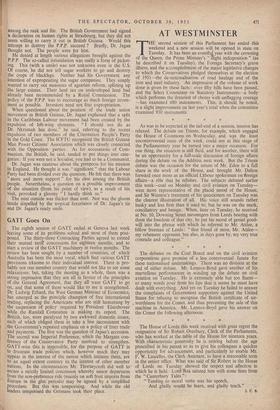AT WESTMINSTER
• -* As was to be expected at the tail-end of a session, tension has relaxed. The debate on Trieste, for example, which engaged the House of Commons on Wednesday, and was the least uncontroversial issue of the week, could not at this stage of the Parliamentary year be turned into a major occasion. For one thing, the situation is still fluid, and for another, there will be an opportunity for a full-scale discussion of foreign affairs during the debate on the Address next week. But the Trieste debate was the occasion for the return of Mr. Eden to a full share in the work of the House, and brought Mr. Dalton forward once more as an official Labour spokesman on foreign affairs—a role that he relishes. The subjects debated earlier this week—coal on Monday and civil aviation on Tuesday— were more representative of the placid mood of the House, and Sir Winston's treatment of his questioners on Tuesday was the clearest illustration of all. His voice still sounds rather husky and less firm than it used to, but he was on the mark, conciliatory and benign. When, later on Tuesday, he received at No. 10, Downing Street messengers from Leeds bearing with them the freedom of that city, he put his mood of genial good- will into the phrase with which he referred to Mr. Attlee, a fellow freeman of Leeds: " that friend of mine, Mr. Attlee— my vehement opponent, but also, in days gone by, my very true comrade and colleague."
* * * The House of Lords this week received with great regret the resignation of Sir Robert Overbury, Clerk of the Parliaments, who has worked at the table of the House for nineteen years. With characteristic generosity he is retiring before the age prescribed in his patent so as to give his colleagues a quicker opportunity for advancement, and particularly to enable Mr. F. W. Lascelles, the Clerk Assistant, to have a reasonable term in the senior office. What was said of Sir Robert in the House of Lords on Tuesday showed the respect and affection in which he is held. Lord Rea saluted him with some lines from the "Canterbury Tales ": " Tending to moral vertu was his speech, And gladly would he learn, and gladly teach." * * * *
The debates on the Coal Board and on the civil aviation corporations gave promise of a less controversial future for these nationalised undertakings. There was no division at the end of either debate. Mr. Lennox-Boyd gave another of his marvellous performances in winding up the debate on civil aviation on Tuesday. He is extremely able but too fluent— so many words pour from his lips that it seems he must have dealt with everything. And yet on Tuesday he failed to answer the complaints of Government supporters against the United States for refusing to recognise the British certificate of air- . worthiness for the Comet, and thus preventing the sale of this machine in America. Mr. Lennox-Boyd gave his answer on the Comet the following afternoon.
J. F. B.


































 Previous page
Previous page